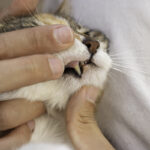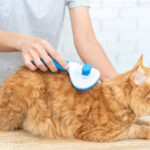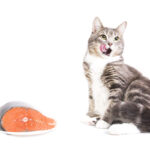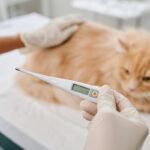Cats sneezing once or twice at a time is completely normal. Just like humans, cats sneeze for a myriad of reasons. Although an occasional sneeze isn’t a concern, excessive sneezing in cats appears to be a symptom of a fatal health condition in the cat. Mostly, felines sneeze quite often due to the irritants and environmental allergens that can be treated easily.
But, if you witness constant Cat Sneezing associated with lethargy, nasal discharge, loss of appetite, and other symptoms then, it indicates that the cat is suffering from some serious health condition. Whenever you notice something abnormal with your cat then, you must immediately check with the veterinarian for proper treatment.
Luckily, cat sneezing is not a life-threatening condition and even if you witness consistent sneezing, it can be managed easily with proper treatment by the veterinarian. To find out why is my cat sneezing suddenly, explore the symptoms, and causes of excessive sneezing in cats.
In this article, we’ll be discussing the diagnosis procedures, treatment options for cat sneezing, and home remedies to cure excessive sneezing in felines. Have a glimpse!
Contents
- Why Is My Cat Sneezing Suddenly?
- Sneezing With Other Symptoms in Cat
- Common and Serious Causes of Excessive Sneezing In Cats
- What To Do If Sneezing Is Too Much In Cats?
- When to Visit a Vet If Cat Sneezing Is Lot?
- How Does A Vet Diagnosis The Cause Of Sneezing In Cats?
- Treating a Cat with Excessive Sneezing
- Home Remedies for Cat Sneezing
- FAQs
- Conclusion
Why Is My Cat Sneezing Suddenly?
Sneezing is a common beneficial bodily function in which the body intensely releases irritants or air from the nose and mouth. It’s a sort of body response that expels the irritants within the nasal passages. In some cases, movement or exhilaration may cause sneezing in cats.
It is pretty much arduous to diagnose the cause of cat sneezing as there could be multiple reasons behind this body’s response. Sometimes, the type of cat’s breed may cause excessive sneezing. If you notice your Cat Sneezing A Lot all of a sudden, you may be worried a lot.

Cats having flat faces including Himalayans, Scottish Folds, Munchkins, and Persians highly tend to suffer from various respiratory problems. Wondering Why Is My Cat Sneezing? Due to the frequent respiratory issues in such cats, we may witness consistent sneezing.
In case, the cat is sneezing continuously i.e., one sneeze followed by several sneezes for over several days then, it could be a sign of allergies in the cat. If sneezing is accompanied by other symptoms, it’s time to visit the vet.
Cat sneezing may also occur due to allergens that are present indoors and outdoors. Some of the allergens include household cleaners, indoor pests, dust, cigarette smoking, etc.
Viral infections could be another cause of sneezing in cats. When a cat has a viral infection, you can witness various symptoms such as watery eyes, low appetite, nasal discharge, and sneezing.
When sneezing is accompanied by green mucous around the eyes and nose, it indicates bacterial infection in cats. Sometimes, dental problems such as tooth root infection may cause sneezing in cats. All these issues could be the reason behind your cat sneezing suddenly.
Sneezing With Other Symptoms in Cat
Sneezing in cats is caused by a variety of reasons. Sneezing in felines may be accompanied by some other symptoms of a wide range of viral or bacterial infections and other underlying health problems. Depending on the cause of the cat’s sneezing, we can witness different symptoms in cats. When cats are sneezing a lot because of cat allergies, the symptoms will be different.
Symptoms of Cat Sneezing caused by Upper Respiratory Infections
Here’s a list of symptoms of Upper Respiratory Infections in cats accompanied by Sneezing. Check it out!
- Coughing
- Sneezing
- Watery Eyes [Conjunctivitis]
- Fever
- Lack of Appetite
- Runny Nose
- Mouth Ulcers
- Lethargy
- Difficulty breathing
- Increased Drooling
- Diminished sense of smell
- Meowing Harshly
Symptoms of Cat Sneezing caused by Allergies
If your cat is suffering from some kind of allergies accompanied by sneezing then, the symptoms will be the following:
- Diarrhea
- Vomiting
- Skin itching all over the body
- Swollen body parts
- Coughing/Wheezing
- Sneezing
- Breathing Difficulty
- Snoring
- Runny Eyes
Symptoms of Cat Sneezing caused by Cat Cold
Go through the list cat sneezing symptoms caused by a cat cold. Check it out!
- Breathing trouble
- Sneezing
- Runny Nose
- Fever
- Eye Discharge
- Coughing
- Mouth Ulcers
- Frequently scratches the face
- Sluggish behaviour
Symptoms of Cat Sneezing Caused by Dental Illness
If your cat is constantly sneezing then, it could be the cause of dental problems in the cat. In such a case, you may witness the following symptoms.
- Vomiting
- Drooling
- Bleeding Gums
- Foul breath
- Swollen gums
- Low appetite
If you find any of the symptoms in your cat caused by a specific underlying health condition, it’s better to contact the veterinarian as early as possible.
Common and Serious Causes of Excessive Sneezing In Cats
Cats usually sneeze for a variety of reasons. Cat Sneezing once or twice is quite common but if this occurs several times and continues for more days then, you must suspect that there’s an underlying cause.
If you are wondering about ‘Why Does My Cat Keep Sneezing’, this article gives you the right answer. The reasons or causes behind the cat sneezing may range from common things to serious illnesses.
When your feline is sneezing a lot, the vet will have some doubt about the cause depending on the symptoms that your cat may display. If the veterinarian suspects the cause of sneezing is an infection then, the vet will take a sample from the nose, throat, mouth, and eyes, and send the same to the lab to check for an infection.
As there is a wide variety of underlying causes behind cat sneezing, it becomes extremely difficult for the vet to diagnose the actual cause of sneezing in cats. Still, you need to understand the reason to give proper treatment for this excessive sneezing. Explore the possible causes of sneezing in cats furnished below.
1. Nose Tickling
If your feline companion is sneezing multiple times but you haven’t noticed any other associated symptoms then, it could be just a nose tickle. Mostly, cats’ noses may tickle due to some dust particles, pollen and even it could be the cat’s hair. If this is the reason behind the cat sneezing then, it is not a serious condition.
2. Feline Upper Respiratory Infections
One of the major causes of sneezing in cats is an upper respiratory infection. The upper respiratory infections that are caused in cats include feline calicivirus and feline herpesvirus.
When a cat suffers from an upper respiratory infection, it is referred to as cat flu. Feline Herpesvirus is an easily transmitted virus among cats through direct contact, food sharing, and inhaling the droplets when the cats sneeze.
Apart from sneezing, the key symptoms of upper respiratory infection in felines include eye and nose discharge, coughing, dehydration, fever, and low appetite. Sometimes, the nose discharge may appear in a variety of colors such as yellow, green, clear, and bloody as well.
3. Allergies
Sneezing can also be caused due to allergies in cats. If your feline friend is hypersensitive to allergens such as dust, pollen, specific foods, etc., it may cause sneezing in cats.
Some of the major symptoms of allergies in cats include itching, skin problems, sneezing, watery eyes, coughing, snoring, swollen paws, ear infections, itchy eyes, red and dry skin, breathing difficulty, etc.
4. Tumors [Neoplasia]
Tumors in cats are also known as neoplasia. Nasal Tumors, polyps, and growths are the key causes of sneezing in cats. The signs of tumors in cats include foul breath, vision issues, facial swelling, eye and nose discharge, bleeding nose, etc.
In general, nasal tumors and sinus tumors may irritate the nasal passages. This in turn results in chronic sneezing and bleeding. Through proper diagnosis, the vet can treat these tumors in cats.
Sometimes, the vet may surgically remove the nasal tumors that block the nostrils. In case, the nasal tumors in cats are cancerous, the vet will treat the cat through chemotherapy and radiation therapy.
5. Dental Disease
Oral disease in cats may cause excessive sneezing. You may be surprised to hear that dental disease in cats may cause sneezing. Well, the roots of teeth on the upper jaw are beside the nasal passages. As they are interlinked, dental disease can cause sneezing.
Other symptoms of dental disease in cats include nasal discharge, coughing, nasal irritation, runny nose, sneezing, etc. When there is an infection in the cat’s tooth, it increases bacteria in the mouth resulting in sneezing and inflammation. If it is ignored, the bacteria may spread to the remaining body parts
6. Foreign Bodies
When a foreign material is obstructed in the nostrils of the cat, it may obstruct the nasal duct. The symptoms of foreign body obstruction in cats include a bloody nose, difficulty breathing, watery eyes, sneezing, etc.
Sometimes, if a cat inhales foreign objects such as foxtails, grass blades, etc., it may irritate the cat’s nasal passages. If the cat inhales those foreign materials, the cat will sneeze to expel the foreign material from the nose.
7. Viral / Bacterial Infections
Viral and bacterial infections are some other causes of sneezing in cats. Viral infections include feline herpesvirus type 1 and feline calicivirus. Bacterial infections include Bordetella bronchiseptica, Mycoplasma, and chlamydophila felis.
Apart from sneezing, the signs of viral and bacterial infections include fever, lethargy, nasal congestion, coughing, enlarged lymph nodes, breathing difficulty, etc. When a cat is suffering from bacterial infections, we can witness yellowish and greenish discharge from its eyes and nose.
Sometimes, these bacterial infections may spread to the nasal passages and damage them even more. Through proper antibiotic treatment, the vet will treat the bacterial infections in the cat.
8. Fungal Infections
Sneezing is one of the common symptoms in cats with fungal infections. Some other indications of fungal infections in felines include swollen noses, cysts, blindness, depression, diarrhea, cough, breathing difficulty, etc. Compared to viral and bacterial infections, fungal infections are less affected in cats.
Still, a fungus namely cryptococcus may affect cats leading to a fungal infection. When a cat has fungal increases, it enhances pain in them. Hence, immediate treatment is highly required to treat fungal infections in cats.
9. Feline Cancer/ Leukemia
Cancer may be another cause of sneezing in cats. However, it is a rare symptom of cancer in felines. If sneezing is accompanied by other signs such as lethargy, sudden weight loss, diarrhea, loss of appetite, lumps, vomiting, etc., then, it is an indication of cancer in cats.
Different types of cancer may affect the cat and each one has a wide range of causes. The major cause of leukemia in cats is the Feline Leukemia Virus. This virus can spread among other cats through saliva, feces, blood, urine, and other bodily fluids.
10. Strong Odor
If your cat’s nose is too sensitive that it can’t tolerate any strong chemical smell then, it may lead to cat sneezing. Although you don’t find those smells strong, your cat may sense them as a strong odor.
When cats smell something bad, it may cause excessive sneezing. Apart from this, some other strong smells may come from body perfumes, room fresheners, cleaning products, etc. All these may cause sneezing in cats because of their strong smells.
11. Nasal & Sinus Problems
Due to Rhinitis and Sinusitis, cats may experience excessive sneezing. Both the problems are considered as feline respiratory problems. When a cat suffers from Rhinitis, it causes a stuffy nose in cats. On the other hand, cats with sinusitis may experience inflammation in the lining of the sinuses.
Some other symptoms of nasal and sinus issues in cats include continuous face pawing, eye discharge, tearing, heavy breathing, nasal discharge in varied colors, snoring, and more. These two issues may cause sneezing in cats.
12. Vaccines
Vaccination is highly important for cats in their early stages after birth. Vaccines could be another cause of the Cat Keeps Sneezing. After vaccinating your cat, you may witness moderate side effects of the vaccine. Some of the mild symptoms include sneezing, coughing, etc.
This may continue in the cat for about 2 to 5 days. In case, the cat is given an intranasal vaccine, they may experience respiratory symptoms. If these symptoms don’t go away after 2 to 4 days after vaccination, it’s better to visit the vet.
By now, you might have got an answer to the query ‘Why Is My Cat Sneezing So Much‘ after understanding the potential causes of cat sneezing. If you figure out any of the causes behind cat sneezing in your feline, take it to the vet to treat the underlying health condition of the feline.
What To Do If Sneezing Is Too Much In Cats?
If your cat is sneezing so much all of a sudden, you may be worried. But, the first thing you must do is to know the cause of Cat Sneezing A Lot. Upon finding the key cause of cat sneezing, you can take action accordingly. If the cat’s sneezing is temporary then, it doesn’t cause any serious problems for the cat.
If the sneezing continues for several days and the frequency of sneezing is consistent then, it must be a concern. For this type of sneezing, treatment is likely necessary. You need to doubt that an underlying disease is causing excessive sneezing in the feline.
It is highly important to assess the condition of the cat and decide whether you need to take the cat to the vet or not. Follow these steps whenever you witness a cat sneezing excessively.
Keen Observation: Observe the cat’s frequency of sneezing i.e., how many times they are sneezing in a day. Watch out if there are any other symptoms in your cat. If you witness any other associated symptoms in your feline like coughing, behavioral changes, loss of appetite, weight loss, watery eyes and nose, fever, nasal discharge, etc., you must take the cat to the vet.
Factors affecting the cat sneezing: Watch out whether your feline is exposed to any of the environmental factors such as smoke, dust, chemicals, irritants, and more. If you find any of these factors are affecting the cat’s sneezing, try to remove them near the cat or take the cat far away from these allergens. Check whether your cat’s sneezing is reduced after moving away from the cat.
Isolation: If you have more than one cat in your cat, try to isolate the affected cat. Make sure you keep the sick cat away from other pets in the house. By doing so, you can prevent further transmission of viral or bacterial infections in your cat. Do this until you diagnose the cause of excessive sneezing.
Evade Human Medication: If your cat is suffering a lot from sneezing, don’t try to give human-related medicine to it. Without proper vet consultation, never give any sort of over-the-counter medicines to the cat.
Consult the Vet: The ultimate thing you need to do if nothing works on your sneezing cat, you must contact the veterinarian. If your cat’s sneezing continues for more than a day or two, you need to schedule an appointment with the vet considering the accompanied symptoms.
The vet will perform a physical examination of the cat. If needed, the veterinarian will perform specific medical examinations like blood work, biopsy, etc., to diagnose the underlying cause of the condition. Based on the test result, the vet will prepare a treatment plan and treat the cat accordingly.
When to Visit a Vet If Cat Sneezing Is Lot?
If your feline is sneezing once or twice in a while with no accompanied symptoms then, there is no problem with your cat. If your cat has mild symptoms with rare sneezing then, try to monitor the cat for a few more days. Make sure you keep your feline friend indoors and observe the changes [if any].
If the sneezing is continuous for more than several days accompanied by low appetite, nose discharge, bloody sneezing, etc., then it is a major concern. If the symptoms remain the same or get worse, you must call the veterinarian immediately. It could be the cause of some underlying medical condition in your cat.
For such cats, veterinary care is required as early as possible. After taking the cat to the veterinarian, they will diagnose the cause of excessive sneezing and provide treatment accordingly. If you ignore the cat sneezing, it may lead to serious health conditions in your feline.
Talk to the vet when you witness the following signs in your cat:
- Weight loss
- Nasal Discharge
- Loss of appetite
- Lethargy
- Symptoms persistent for more days
How Does A Vet Diagnosis The Cause Of Sneezing In Cats?
The veterinarian will diagnose the cause of sneezing in cats by performing necessary medical examinations. However, treatment for sneezing in felines may not be expensive. However, the procedures performed on the cat to diagnose the underlying cause of sneezing can be costly.
The veterinarian will perform the following medical tests to determine the underlying cause of excessive sneezing in cats.
1. Physical Examination
The vet will perform a thorough physical examination to watch out for all the visible symptoms of health problems in the cat. After performing the needful baseline tests, the vet will be able to assess the overall health condition of the feline.
The vet will also perform a dental examination as part of the physical exam to find out whether there is any oral disease in the cats leading to persistent sneezing.
2. X-Rays
To evaluate the level of damage caused within the nose of the cat, the vet will perform imaging. Mostly, the vet performs an X-ray of the cat’s chest, and head to look for an underlying medical condition.
However, the gold standard for imaging a sneezing feline is performed through a computerized tomography scan. To perform this scan, the vet will give general anesthesia to the cat. This type of scan is done on the cat only if it is an emergency or referred by the vet.
3. Biopsy
Usually, the vet will require a biopsy of the cat’s nasal cavity walls to look for any cancerous condition, inflammation, or fungal infection in the cat.
4. Rhinoscopy
Rhinoscopy is usually conducted on the cat when there is a nasal blockage. To look for tumors, polyps, and fungal plaques in the nose of the cat, the vet performs a rhinoscopy. During rhinoscopy, the cat will be sedated.
Further, a flexible tube [referred to as an endoscope] comprising a camera will be put up the nose of the cat. The fiber optic cable connected to the tube will show what’s inside the nose. If the vet finds any polyp or foreign object inside the nose, the vet will use forceps to pull it out.
5. Nasal Lavage
Nasal Lavage is a kind of flushing the nasal passages of the cat under anesthesia. Through this test, the vet will be able to disclose the diagnostic details such as plucking out the foreign body. It is considered a medical examination as well as treatment given to the cat.
Treating a Cat with Excessive Sneezing
Once you take the cat to the vet, he/she will perform any of the aforementioned medical examinations on the feline. The vet will diagnose the underlying medical condition and treat the cat accordingly. Wondering What kind of Cat Sneezing Treatment is required?
Depending on the cause of excessive sneezing in cats, the veterinarian will give treatment to the feline. A wide array of treatment options are available for a sneezing cat. The ultimate aim of treatment is to diminish the frequency of sneezing in cats.
If the condition is more serious than expected, the goal of the vet is to provide treatment to reduce the severity of the symptoms but not to cure them completely. Here’s a list of treatment options that the vet will administer to the cats depending on the cause of excessive sneezing.
Antibiotics: Usually, the vet will administer antibiotic treatment to the cat to treat bacterial infections in felines. By administering antibiotics to the cat, it feels better as consistent sneezing will be reduced.
Nasal Lavage: It is a type of treatment performed on the cat under general anesthesia. This helps in relieving clinical indications temporarily irrespective of the cause of sneezing. Through nasal lavage, the unseen foreign body can be flushed out of the nose.
NSAIDs: Non-steroidal anti-inflammatory Drugs are administered in case of fever and mouth pain in cats.
Vaporizers: For congested or blocked noses, the vet will administer nasal saline drops, vaporizers, and mucus thinners to the felines.
Other treatment options include the following:
- Steroids
- Humidifiers
- Antihistamines [such as cetirizine, diphenhydramine, etc]
- Air Purifiers
- Nebulizers
- L-Lysine to reduce the eruption of herpesvirus
- Anti-Nausea Medicines
- Decongestants
- Surgery [In case of serious health problem]
Home Remedies for Cat Sneezing
If your feline is suffering from mild to moderate levels of sneezing, you can try some Home Remedies for Cat Sneezing. Here are some of the home remedies furnished below to treat cat sneezing.
- Stop using air fresheners, scented products, chemicals, cleaning products, and other strong odors in your house when a cat is roaming around.
- The strong odor of these products may cause sneezing in cats and sometimes it could lead to respiratory disease. When cats inhale the smell of toxic disinfectants, it can be dangerous and sometimes life-threatening to cats.
- If the environment is extremely dry, it can cause sneezing and a blocked nose in cats. To bring back moisture in the air, you can use vaporizers. This will aid in easing the symptoms in felines.
- If your cat is suffering from some viral or bacterial infections, you can help your cat fight against the infections by feeding them healthy and nutritious food. Try to feed tham warm food so that the cat will be able to notice the smell easily.
FAQs
Here are some of the frequently asked questions related to excessive sneezing in cats, and kittens, symptoms of cat sneezing, and more. Check it out!
Why Is Kitten Sneezing All Of Sudden?
If your cute little furry friend is sneezing all of a sudden then, it could be an infection in the cat. In such a case, the veterinarian will take a swab from the kitten’s eyes, nose, throat, and mouth.
To check whether the kitten has an infection or not, the swab will be sent to the lab. After checking the medical test result, the vet will give the necessary treatment to the kitten.Why An Indoor Cat Sneezes A Lot?
If an indoor cat is sneezing a lot then, it could be because of some chemical products used in the house. Some odd smells of cleaning products, perfumes, spicy foods, cigarette smoke, etc may trigger sneezing in cats that are indoors.
Why Is the Elderly Cat Sneezing A Lot?
If your elderly cat is sneezing accompanied by other symptoms such as tearing eyes, nasal discharge, and more then, it could be an indication of a viral upper respiratory infection in the cat. Otherwise, it may be the cause of a serious health condition in the feline.
Is Sneezing Serious In Cats?
If the cat sneezing is occasional then, it is considered a normal thing. But, sneezing is accompanied by other symptoms like lethargy, and loss of appetite, and more, sneezing is considered a serious condition in cats because of some underlying medication problem.
How Much Sneezing Is Much For Cats?
If the cat sneezes once or twice then, it doesn’t need medical assistance. But, if your feline companion is experiencing persistent sneezing for several days, weeks, and months, then, it is too much for the cat. Immediate medical care by the veterinarian is required for the cat.
When Should I Worry About My Cat Sneezing?
If the feline is sneezing rarely then, it is an indication that the cat is trying to clear its nasal blockage due to some foreign objects. If the cat’s sneezing is associated with other severe symptoms then, the condition of the cat could be serious.
In such a case, you may witness specific symptoms such as wheezing, coughing, no appetite, and more. It’s a worrisome situation for the pet parent that needs immediate medical assistance.
Conclusion
Well, this is everything you need to learn about ‘Is your cat sneezing a lot? ‘. We hope this article has helped you in finding the key causes and symptoms of sneezing, diagnosis, and treatment for the cat. Cat sneezing may also arise from specific allergies, vaccine side effects, tumors, or simply a nose blockage.
No matter what the reason is, it must be treated right away to avoid further symptoms in the cat. If you witness a bloody discharge from the nose and if the cat declines to eat then, you must immediately contact the vet. If you have any doubts about this article, just drop them in the comments section.
Stay tuned to our website ‘TheCrazyCats.Net’ for more articles related to pet food habits, pet behavior, pet-related diseases, and more.





